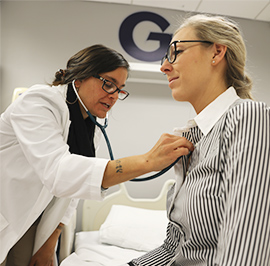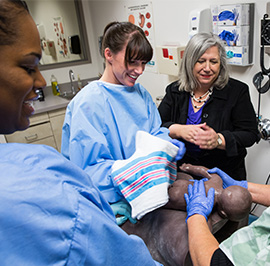OCI I: Advanced Health Assessment (AHA)
All MS in Nursing students complete the Advanced Health Assessment (AHA) OCI, regardless of specialization. AHA OCIs are typically three days in length.
This is the student’s chance to meet fellow classmates and faculty in person and strengthen existing professional relationships. While the weekend is rigorous, we encourage students to interact with their peers and explore all that Georgetown has to offer.
During the first half of the weekend, students are broken into small peer groups that rotate between several different lab workshops facilitated by faculty, to practice and refine physical examination skills. After these faculty-led workshops, students will have an opportunity to practice what was learned and ask questions in preparation for the exam.
The following morning, students will have the opportunity to practice their “head to toe” physical examinations with peers. After practice sessions are completed, students are split into groups to alternate between completion of final physical examination testing and genitourinary teaching associates (GUTA) sessions for the remainder of the weekend.
GUTAs are certified female and male standardized patients who are specifically trained to teach, assess, and provide feedback to learners about accurate genitourinary examination techniques. The GUTAs are trained to facilitate the “first” experience of performing a genitourinary exam. They also address the communication skills needed to provide a comfortable exam in a standardized manner, while using their bodies as teaching tools in a supportive, nonthreatening environment.
After successful completion of the final examination, students participate in a pinning ceremony on the last day of the OCI, during which faculty and students come together to celebrate this important milestone before entry into their specialty programs. Students receive a Georgetown University School of Nursing pin, which can be proudly worn at the student’s clinical placement site.






